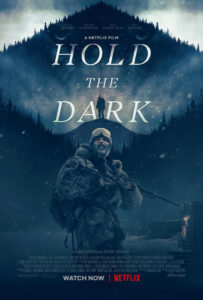Director Jeremy Saulnier continues to explore the primal side of human nature in his provocative new film “Hold the Dark.”

 After receiving a handwritten letter from grieving mother Medora (Riley Keough), wolf expert and wilderness writer Russell Core (Jeffrey Wright) decides to make the trip to visit her in a remote Alaskan town. But he’s making this journey for himself. Russell is estranged from his own daughter and Medora’s heartfelt words reach into the same emptiness that he also feels. Russell once killed a she-wolf, only to regret it later, but he reasons simply that he had no choice. It’s a crime for which he must atone. This becomes a metaphor that permeates a dense, emotional narrative. Nagging questions hang about, was it a wolf that Russell killed?
After receiving a handwritten letter from grieving mother Medora (Riley Keough), wolf expert and wilderness writer Russell Core (Jeffrey Wright) decides to make the trip to visit her in a remote Alaskan town. But he’s making this journey for himself. Russell is estranged from his own daughter and Medora’s heartfelt words reach into the same emptiness that he also feels. Russell once killed a she-wolf, only to regret it later, but he reasons simply that he had no choice. It’s a crime for which he must atone. This becomes a metaphor that permeates a dense, emotional narrative. Nagging questions hang about, was it a wolf that Russell killed?

Once arriving in Medora’s rural community, Russell discovers what he thinks is a mother dealing with traumatic loss. But, to his detriment, he fails to heed the cryptic warnings of a local Native American woman named Illanaq (Tantoo Cardinal). What’s happened to Medora, Russell believes, is rare but easy to recognize—a wolf has taken her little boy. And relying on Medora as his guide, she explains that her son is the community’s third child taken. She wants Russell to track it, kill it, and bring it to her. Medora reasons that when her husband, Vernon (Alexander Skarsgård), returns from his tour of duty in Iraq, she must have something to show him.
But when Russell returns from hunting, he finds that Medora has gone and left in her wake evidence of a grisly crime. The local sheriff (James Badge Dale) gets involved, forcing Russell to stay in an attempt to unravel the mystery. And Vernon’s premature return from the field of battle only complicates things, as he takes off in search of Medora, determined to carry out his own murderous brand of justice.

What starts out like some kind of hunting ode with supernatural elements turns into a much more introspective journey. Told from three main perspectives, two of which seem unearthly, the story requires quite a bit of heavy lifting to digest. Adapted by Macon Blair (“Blue Ruin”) from the novel by William Giraldi, “Hold the Dark” is one of the least explicit films I’ve seen this year. The tone and visual strength is on par with Panos Cosmatos’ infinitely more direct “Mandy.” But “Hold the Dark” certainly isn’t a straightforward revenge yarn. There are layers upon layers. And it’s not too much to respectfully suggest that maybe even Saulnier and Blair fail to fully comprehend the specific themes they are exploring.
Therefore, into today’s unequivocal and audience-pandering landscape, the Saulnier/Blair team give us ambiguity all, leaving the viewer to unpack nuanced meanings. To be fair, it is possible to look at the film as a simple quest for justice—a vigilante story. The damaged Russell is our more human relatable key into the twisted mental anguish that has overtaken the couple, Medora and Vernon, at the center of the violence around them.

Without spoiling certain critical moments, Saulnier’s fans can rejoice, he’s stayed true to his commitment to use of practicals that convey the deep-rooted hardness of violence left unchecked. Expect no computer generated wolves or animated trickery in this one. And one extended scene involving a high-powered machine gun is especially piercing. This sequence plays well against the more tender, if I can say that, use of violence that ushers in the movie’s unresolved resolution.
“Unresolved resolution?” Yes, I’m tiptoeing around how Saulnier and Blair choose to end this visceral, naturalistic narrative. For a moment, I briefly thought of something like “Cat People,” but then I put that simplistic idea out of my mind. I’ll try to not define this film by merely referencing another.

So, for me, if I have to boil it down, the movie is about finding a way back. Russell is searching for a reason to reunite with his daughter—he requires a trigger. Vernon, who we learn has always been alien to the rural wilds of Alaska where he grew up, is violently searching for a kind of justice that made no sense to him even on the relatively binary battlefield. And Medora sees herself as the tortured and stricken muse, the catalyst to end the suffering, even through use of evil. The emotional scars run deep, and the living go on for a lifetime tending to malingering wounds. The somber suggestion may be that there is a way in death to avoid the darkness.
“Hold the Dark” is streaming now on Netflix.
